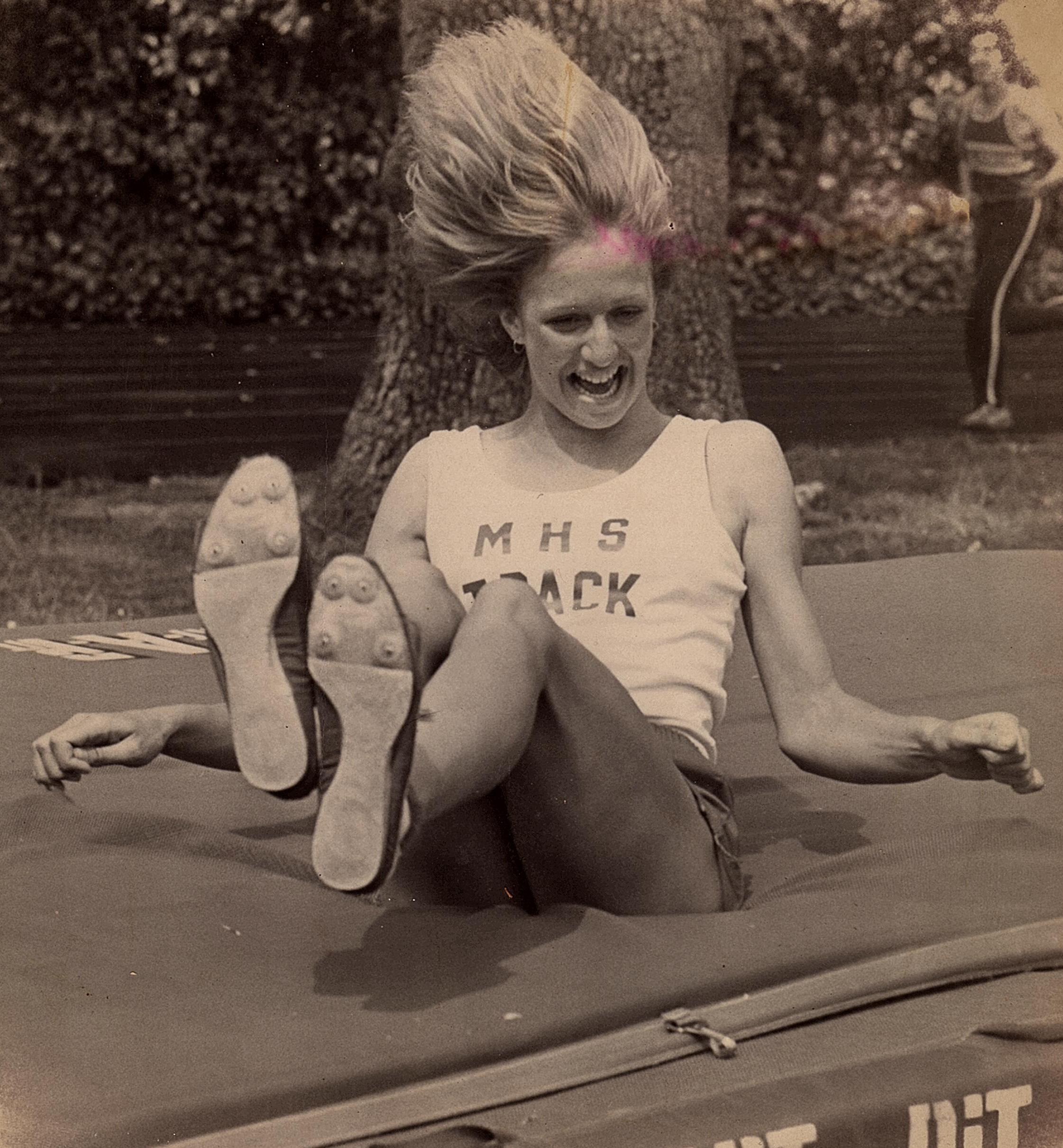Recap
Title IX (June 1972) opened up Track & Field and Cross Country to girls who had never before had the chance to compete in these sports.
1978
The first girl in the Redwood Empire to really get major attention with headlines in The Press Democrat’s was Montgomery’s Deanne Neff, who they labeled the “Empire’s track darling”. See story here
Neff’s best event was the high jump, where she cleared an NBL finals record of 5-6 which was not matched until 2013 by Santa Rosa’s Morgan Bertsch. Neff dominated that event, winning the Santa Rosa All-City meet, NBL, North Coast Section 3A, NCS Meet of Champions again clearing 5-6, before tying for 8th at state, at yet a third 5-6 clearance. That mark lasted as the Empire record until 1989.
She was almost as good at the long jump, sailing 18-0, and winning the Santa Rosa All-City meet, NBL, and the NCS 3A, before missing state by one spot at MOC in 5th. That distance tied McCoy’s Empire record and was not broken until 1982.
Running was no problem for Neff either as she won the NBL 440 title in both 1977 and 1978, with a best of 58.5 (58.40-400). That mark tied Edden’s Empire record and was not broken until 1985.
In cross country, Neff was a member of the 1976 Montgomery team that scored a perfect 15 point score in the NBL finals. She won the 1977 NBL finals, helping her team win the pennant again that year. Pretty rare to have a 5-6 high jumper who can also win league in cross country.
After high school she went on to the Santa Rosa JC and Sonoma State competing under her married name of Deanne Malvino. She became our area’s first NCAA track champion, winning the 1984 NCAA III National Heptathlon Championship. See story here
Some other individual marks she accomplished included, 14.74 100HH, 61.66 400H, 18-2¾ LJ all in 1984 and 5-8¼ HJ in 1979.
Interview with Deanne about her High School days.
Was Title IX a big deal in your mind back then or was it not something you were really thinking about at the time?
In high school I felt there was a sense of resentment among some coaches in the sports world, as though the girls were taking money away from the boys teams.
I did not hear of a girls track team at Herbert Slater Junior High when I was there. Looking back, I wish I had had the encouragement and confidence to run and jump on the boys team. I went out for gymnastics.
What are your feelings about the impact it had on your life?
Thankful I had the opportunity to run Cross Country and participate in Track & Field. Sports gave me a healthy focus.
Did you ever think about not doing track?
No, it never occurred to me not to run track. It was the most important thing to me back then.
Did you ever have a performance in a meet that even surprised you?
I had high expectations of myself. There were so many races where I was afraid of running a race and not doing the best I could. Coaches would tell me I was my own worst enemy because of the pressure I would put on myself.
What was your favorite accomplishment?
Number one was qualifying for the 1978 State track meet. Another was winning the NBL Championships in cross country.
Were there times when someone; coach, official, press etc., did something that showed you that girls track was as important as the boys?
When I was in 6th grade I took a summer school class and Jeff Held was my teacher. When I told him my parents took me down to Sonoma State to run in the All-Comer meets there he told me to come out for cross country when I got to Montgomery. He was a very good and supportive coach to the girls who came out to run. He gave us trophies for pioneering cross country running at Montgomery. This trophy I’m the most proud of. (Held coached Deanne and the Viking girls to NBL pennants in 1976 and 1977).
My friend and teammate Randy Hitchcock (6-6 jumper) taught me how to high jump. My first year I did the scissors kick over the bar as a sophomore.
Were there times when even though Title IX was in effect, it seemed like girls still got the short end of the stick?
The girls did not get the attention from some of the coaches at that time.
The All-City meet was one of my favorites. The girls had less events because of the number of girls participating. My senior year the medals being given out were for 1st thru 3rd for both the Varsity and JV boys events, but only first place for girls. This seemed unfair and discouraging to me. I questioned this and as a result they decided not to give out any medals that year.
It was difficult to find competition. Sometimes the coaches did not enter me in Invitational meets. Finding out later they did have girls events at them was a huge disappointment to me.
How did you feel the boys on the team accepted girls being on the team? How about the coaches?
I feel the boys accepted the girls right away. Not all coaches seem to have the same acceptance. But as some of those same coaches had daughters and granddaughters competing later the attitude changed.
Cross Country is a sport where everyone encourages each other, whether you’re first place or the last finisher, boy or girl, as long as you try.
Do you think Title IX has meet its goal and if not what needs to change?
By the next generation, which my daughters were all competitors, the girls expected equality. This is the way it should be.
